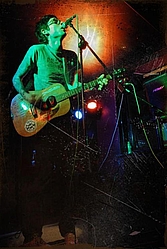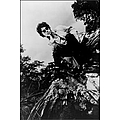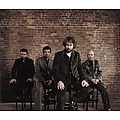Биография Mike Scott
Scott was born and raised in Edinburgh, Scotland. His father left the family when Scott was ten years old. Scott notes that he has "a lot of baggage to do with that, and [is] hurt over it and [is] vulnerable and [is] angry" Scott was interested in music from an early age. At age twelve, after the family had moved to Ayr, he began a serious interest in learning guitar. Scott remembers that, "from the minute [he] bought" Last Night in Soho by Dave Dee, Dozy, Beaky, Mick and Tich in 1968 "knew [he] had to be in music", and mentions listening to Hank Williams as a "life-changing" experience. The next year, Scott was playing in school bands and formed the band Karma, named after the tenet in Hinduism, with a friend named John Caldwell. Karma's sound was inspired by David Bowie, The Beatles and Bob Dylan. In 1977 Scott entered Edinburgh University, studying English literature and philosophy. Scott would later arrange poetry from William Butler Yeats, Robert Burns, and George MacDonald for The Waterboys recordings. Other literary influences on Scott's career include C.S. Lewis and The Diary of Vikenty Angorov. Scott left Edinburgh University after his first year. Scott became interested in the United Kingdom punk music scene, and began writing for fanzines, eventually starting his own, Jungleland. Scott was especially interested in the music of The Clash and Patti Smith, a tribute to whom, "A Girl Called Johnny", would become the first Waterboys' single. Pre-Waterboys musical career:- Whatever Happened to the West?, the second single from Another Pretty Face, demonstrates an entirely different aesthetic and style than later Mike Scott projects. Scott and a guitarist named Allan McConnell formed a band, The Bootlegs, which gave way to Another Pretty Face in 1978 when Caldwell and two other friends joined. The friends created their own record label, named New Pleasures, "obtained financial backing from the enigmatically named Z" and began releasing Another Pretty Face's singles. The band achieved remarkable success with their first single "All the Boys Love Carrie"/"That's Not Enough" when New Musical Express named it "Single of the Week". The band signed a contract with Virgin Records, was featured on the cover of Sounds magazine, and toured with Stiff Little Fingers. Virgin, however, after receiving a demo tape from Another Pretty Face, released the band four months after the signing. Nikki Sudden, who had interviewed Another Pretty Face in Edinburgh for ZigZag magazine, asserts that "the APF stuff is still some of Mike Scott’s best work". In 1980 through 1982 Scott, amongst other projects, began working with Sudden. Another Pretty Face continued to release music, and came to the attention of Nigel Grainge, founder of Ensign Records. Grainge signed Another Pretty Face to the label, and the band moved to London, changing its name to Funhouse (taken from the name of The Stooges' album Fun House). Scott had become dissatisfied with the band. He later described Funhouse's sound as "similar to a jumbo jet flying on one engine". Scott began working on solo songs and recordings, a decision that led to the creation of The Waterboys. A December 1981 session at Redshop Studios formed the beginnings of The Waterboys' first album, The Waterboys. The Waterboys:- The Waterboys' membership has changed a great deal throughout the group's existence. Anthony Thistlethwaite, Karl Wallinger, Kevin Wilkinson and Steve Wickham all made major contributions, but Scott describes the band as his project. "[T]o me there's no difference between Mike Scott and the Waterboys; they both mean the same thing. They mean myself and whoever are my current travelling musical companions.". The Waterboys' first release was a single of "A Girl Called Johnny" in March of 1983. The first album came out that June. Along with The Waterboys, the next two albums, A Pagan Place and This Is the Sea, released in 1984 and 1985, contained songs mostly written by Scott, and together formed the band's "Big Music" period. After the official addition of fiddler Steve Wickham and a move to Ireland, the next two albums Fisherman's Blues (1988) and Room to Roam (1990) were instead Irish music-inspired folk-rock, a sound similar to that of We Free Kings, a band that Scott and Wickham performed with in 1986. Scott's musical style changed again when he, under the name The Waterboys but without any other members, recorded a hard rock album, Dream Harder, in 1993. It was the last album to come out under the band's name until 2000. The band had dissolved over personnel issues and Wickham's desire to remain with a folk-rock, or purely folk music, sound. After two Mike Scott solo albums, A Rock in the Weary Land was released under The Waterboys name, demonstrating yet another musical style, which Scott called "Sonic rock". 2002's Universal Hall was a return to a folk-rock sound. It was followed by Karma to Burn, released in 2005, which was the groups' first official live album. Solo albums:- 1997's Still Burning was the last Scott solo album before re-forming The Waterboys. Enlarge 1997's Still Burning was the last Scott solo album before re-forming The Waterboys. In addition to the albums he released with The Waterboys, Scott released two solo albums in the nineties. The first Bring 'em All In (1995), was recorded at the Findhorn Foundation in north Scotland, with Mike Scott playing all instruments himself. In contrast, for his second solo album, Still Burning (1997), Scott assembled a group of session musicians including Pino Palladino and Jim Keltner. Guesting on the album was former Icicle Works frontman Ian McNabb. Songs from the two albums appeared on 1998's compilation album The Whole Of The Moon: The Music Of Mike Scott And The Waterboys along with songs from The Waterboys. Scott created his own record label Puck Records in 2003, which released The Waterboys' Universal Hall. In 2005, Karma to Burn was released, also by Puck Records, and included tracks from Scott's solo career played by the current The Waterboys line-up. Discography:- Solo:- * Bring 'em All In (1995) * Lion of Love (fan club only release.) * Sunflowers (fan club only release.) * Still Burning (1997) * The Whole Of The Moon: The Music Of Mike Scott And The Waterboys (1998) (Best-of collection including material from The Waterboys) Another Pretty Face * I'm Sorry That I Beat You (1981) Another Pretty Face released a number of music singles, including: * All the Boys Love Carrie (1979) * Whatever Happened to the West? (1980) * Heaven Gets Closer (1980) * Soul to Soul (1981) All info from Wikipedia.com
Тексты популярных песен Mike Scott
Оставить комментарий
Что вы думаете об исполнителе Mike Scott? Напишите ваш комментарий.
Альбомы Mike Scott
Похожие исполнители
- World Party80s/Rock
- Hothouse Flowers80s/Folk/Pop
- Luka BloomAcoustic/Folk
- Bruce CockburnFolk/Rock
- Lloyd Cole80s/Pop
- Maria McKeeCountry/Rock























